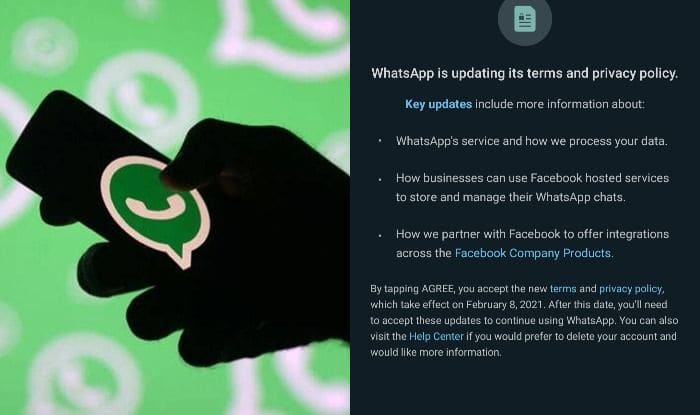Some people are worried about WhatsApp’s change in terms. They wonder if they should switch to some other platform, some other app. Those are reasonable questions. However, let’s take a step back and look at the bigger picture from a wider perspective before jumping to conclusions. Let’s act out of confidence rather than out of fear. After all, the Lord has given us many gifts, but fear is not one of them. ‘For God has not given us a spirit of fear and timidity, but of power, love, and self-discipline.’ (2 Tim. 1:7, NLT)
WhatsApp is owned by Facebook. That’s been true for years; it isn’t changing. It’s also true that Facebook says they can’t see what you write, hear what you say, or see your video conversations in WhatsApp. That is also not changing.
So what is changing? Apparently, the new terms allow Facebook to see what WhatsApp can see. So what is it they can see? What of yours does Facebook want to see and sell on to their clients? What can they sell, if they can’t see the contents of your conversations? Your metadata.
What’s metadata?
Your metadata includes your location, who you communicate with and when, and what device you’re using. Facebook has always been more interested in who you associate with than any contents you share on their platform.
Facebook thinks they can define you based upon your relationships. To put it another way, Facebook thinks you are who you talk with. They don’t know you, but they don’t want to, either. You’re just a commodity to be sold: an object to make money from.
When it comes down to it, Facebook abstracts you. We all do it. We all label people. He’s a Ford Mondeo man. She’s an accountant. He supports Manchester United. She shops at Costco. He wears Pierre Cardin. She’s tall. He’s blonde. The problem is that we then begin to define ourselves by those labels. What we don’t realise is that we cannot be defined that way without dehumanising ourselves or others. That’s just not who we are. Doing so robs us of who we were designed to be.
- I am not who I associate with. (Hello, Facebook)
- I am not what I do.
- I am not what I look like.
- I am not what I buy.
- I am not what I search for. (I see you, Google)
- I am not what I’m made of. (Hello, secular humanism)
I am not even who I think I am. I am who God says I am. Stop and think about that for a minute. God knows us inside and out. He fathered us and despite knowing our deepest secrets and fears, He loves us deeply, unconditionally, unwaveringly, forever. That’s who I am. I’m made in His image for relationship with Him and others: deep, satisfying, unending relationship. That’s who I am.
Facebook saw our desire for relationship and monetised it.
Back to the WhatsApp question, then, should I stop using WhatsApp because now Facebook can monetise me as a commodity? Perhaps, if I’m also going to stop using Facebook completely. Otherwise, what’s the point?
If I were to switch to a different app
- How does the app monetise me? So is the new app any better than Facebook?
- What can the new app see about my communication, and is that important to me? (What I say, who and when I talk to them, where I am, etc.)
- How will I get those I communicate with to switch to the new app? Unless they switch, too, I won’t be able to talk to them on the internet any more.
So maybe it’s worth switching apps, maybe not. However, whether I switch or not, Facebook will never know who I really am because they have too narrow a definition of who I am. The question is, do I also define myself in a way that distorts or denies God’s image in me? Who is God, and how does He define who I am?
Those are the questions that are more important to me.
Feel free to post your comments on this topic below.

Yes, Facebook, Google, Amazon, and a bunch of other sites use my meta data and see ‘me’ as a target market to be sold to others. No, I’m not always comfortable with that. I am aware however of Christians and churches who do the same, targeting others as converts to be won and counted rather than people to be known, cared for and listened to.
The same technology that serves adverts to us and sells us to the advertisers, can be and is being used to reach out to people in the name of Christ. I hope Paul’s reflection will help us to remember to see beyond the meta-data of those we seek to serve.
Thank you for this article, Paul. It is a good reminder to maintain a healthy perspective. That said, it’s clear that Facebook gathers, uses, and shares every shred of data you enter on the website. I am convinced that Whatsapp is moving in the same direction one policy change at a time, and that is sobering because my communication on Whatsapp is more personal than the limited content I share on Facebook. I’m planning to transition away from Whatsapp as soon as possible, before it gets any worse.
Very helpful. Saved me a ton of time trying to research this on my own. Thank you!
What a concise article! Indeed we are who God says we are. We live in the information age and unless we chose to completely stay out of social media -which we cannot as communicators seeing as it is not “main-stream” media, we must find our identity in Christ and be secure in that. Thanks!